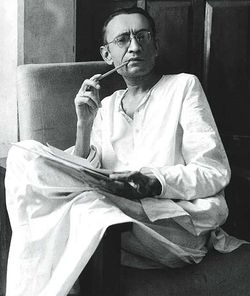Sarah Waheed in HimalSouthAsian:
An unearthed file gives new insight into Saadat Hasan Manto and his short story ‘Bu’.

‘Bu’ is about the sexual exploits of a young college educated man named Randhir. It opens in Randhir’s apartment during the rainy season, explaining how he found himself with a Ghatan girl lying in bed with him, “clinging to his body”. The word “Ghatan” leaps off the page. It refers to a tribal or low-caste group of migratory laborers in Maharashtra, associated with the Western Ghats of India. Incidentally, in colonial legislation over familial litigation about intermarriage, conversion and adoption in Bombay, the term ‘Ghatan’ was also used to refer to lower-caste Hindu converts to Christianity. In ‘Bu’, the reader is told that Randhir had seen the Ghatan before, as she worked at a nearby hemp factory. Randhir is lonely, because “the war was on, and most of the Christian girls of Bombay who were easily available in the past had joined the auxiliary force, many opening dancing schools near the Cantonment where only white soldiers were allowed”. Feeling jilted by a former Christian lover who lives in his building, Randhir spots the Ghatan woman from his balcony. She is dark-complexioned and “earthy”, standing beneath a tamarind tree in the rain, and Randhir calls her up to his flat. What follows is a narration of their sexual encounter. Randhir is drawn to the woman’s odour, one that is “both pleasurable but which simultaneously disgusts him”. The story ends with another description of Randhir’s flat during the rainy season, in a jagged doubling that is common in Manto’s narratives. This time, he is not clinging to the sleeping woman lying on his bed. This other nameless woman is fair and her whiteness is revolting for Randhir. She is his newly-wed wife, “the daughter of a first class magistrate”, but Randhir has no sexual desire for her, and the story ends with him yearning for the odour of the Ghatan woman.
Manto and the editors of Adab-e-Latif first faced the proscription of the short story through the Defense of India Rules, under a clause that sought to curb publication of material against the government. The first time the short story was noticed by the state was when it caught the attention of officials in the War Department in the spring of 1944. In a flurry of memos, ‘Bu’ was deemed objectionable because of its references to the Women’s Auxiliary Corps of the British Indian Army.
More here.
